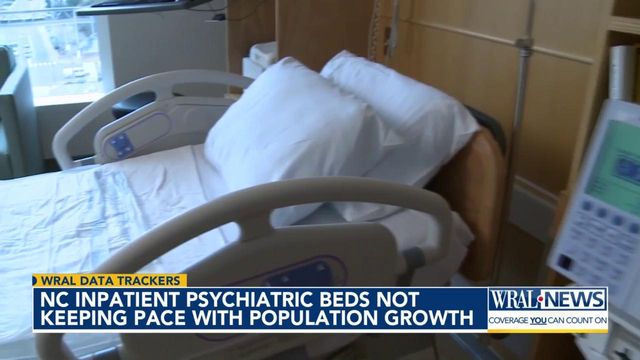North Carolina faces state psychiatric bed crisis, has lost half of those available in recent years
North Carolina needs more beds for people who are struggling with mental health issues.
Data from Treatment Advocacy Center shows fewer than 500 state psychiatric hospital beds were available when they requested the information from the state Department of Health and Human Services in mid-2023.
A NCDHHS spokesperson says that number has actually increased a bit over the past several months, writing in an email, "Out of the three state psychiatric hospitals, maximum capacity is 902 beds. However, staff vacancies are keeping 300 of those beds empty, meaning we have the ability to staff 600 beds. As of this morning, those 3 facilities had a combined patience census of 599."
Still, the data shows that's down from about 900 staffed beds in 2016, and North Carolina's population has grown significantly over the past eight years.
"The number of inpatient psychiatric beds had not kept pace with that population growth in particular with the exacerbation the worsening of mental health concerns," said Dr. Samantha Meltzer-Brody, the chair for UNC's Department of Psychiatry. "
The state – and country – have long been losing spots for patients with mental health issues for decades, she says. The doctor described the cause as "complicated," saying that at one point, there were many beds and the model focused on long-term care. But there was a change in payment models, related to insurance reimbursement, and that affected how healthcare systems keep beds or not.
"Unfortunately, what happened was, we ended up with far too few beds, not enough community cervices, and not enough access for care," she told WRAL News.
In the 1950s, there were about 340 inpatient beds per every 100,000 residents in the country, according to the data. Now, it’s down to around 11, nationwide. In North Carolina, it’s even lower, at about four state psychiatric beds per capita, which far below what researchers have found that the optimal number of beds per 100,000 -- between 40 and 60.
Meltzer-Brody says she’s hopeful, though. This budget, the state is making an investment to address the shortage and the issues with treatment and care, allocating an estimated $750 million to mental health care.
"Ultimately, getting care and treatment saves lives," Metlzer-Brody said. "People suffering in silence, not getting care, and certainly not getting care because they're worried about the stigma and end up ending their lives or having terrible outcomes.
"That's tragic and heartbreaking. There is so much we can do with treatment, and it really can be such a wonderful intervention that changes the course of that person's life for the better."
North Carolina is one of 19 states that has seen the number of beds decrease by more than 20 percent since 2016. Only six states increased the number of staffed beds by more than 10% in that time.
Mental health resources
If you're having suicidal thoughts or a mental health crisis, call or text 988 or call the National Suicide Prevention Lifeline at 800-273-8255. Veterans can press “1” after dialing 988 to connect directly to the Veterans Crisis Lifeline. For texts, veterans should continue to text the Veterans Crisis Lifeline short code: 838255.
In the wake of tragic and traumatic events, feelings like stress, anxiety, grief and depression are natural. Here is a list of crisis counseling and county-by-county resources in North Carolina, as well as nationally. These resources are available for you – just call.












